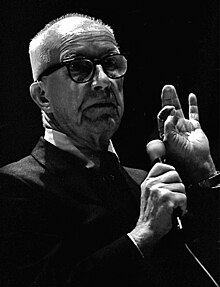Richard Buckminster Fuller
| Buckminster Fuller | |
|---|---|
 |
|
| Born |
Richard Buckminster Fuller July 12, 1895 Milton, Massachusetts, United States |
| Died | July 1, 1983 (aged 87) Los Angeles, United States |
| Education | Harvard University (attended) |
| Occupation | Designer, author, inventor |
| Spouse(s) | Anne Hewlett (m. 1917) |
Richard Buckminster "Bucky" Fuller (/ˈfʊlər/; July 12, 1895 – July 1, 1983) was an American architect, systems theorist, author, designer, and inventor.
Fuller published more than 30 books, coining or popularizing terms such as "Spaceship Earth", ephemeralization, and synergetic. He also developed numerous inventions, mainly architectural designs, and popularized the widely known geodesic dome. Carbon molecules known as fullerenes were later named by scientists for their structural and mathematical resemblance to geodesic spheres.
Fuller was the second World President of Mensa from 1974 to 1983.
Guinea Pig B:
I AM NOW CLOSE TO 88 and I am confident that the only thing important about me is that I am an average healthy human. I am also a living case history of a thoroughly documented, half-century, search-and-research project designed to discover what, if anything, an unknown, moneyless individual, with a dependent wife and newborn child, might be able to do effectively on behalf of all humanity that could not be accomplished by great nations, great religions or private enterprise, no matter how rich or powerfully armed.
— Bucky Fuller, 1983
Fuller was born on July 12, 1895, in Milton, Massachusetts, the son of Richard Buckminster Fuller and Caroline Wolcott Andrews, and grand-nephew of the American Transcendentalist Margaret Fuller. He spent much of his youth on Bear Island, in Penobscot Bay off the coast of Maine. He attended Froebelian Kindergarten. He had trouble with geometry, being unable to understand the abstraction that a chalk dot on the blackboard represented a mathematical point, or that an imperfectly drawn line with an arrow on the end was meant to stretch off to infinity. He often made items from materials he found in the woods, and sometimes made his own tools. He experimented with designing a new apparatus for human propulsion of small boats. By age 12, he had invented a 'push pull' system for propelling a row boat by use of an inverted umbrella connected to the transom with a simple oar lock which allowed the user to face forward to point the boat toward its destination. Later in life, Fuller took exception to the term "invention".
...
Wikipedia
